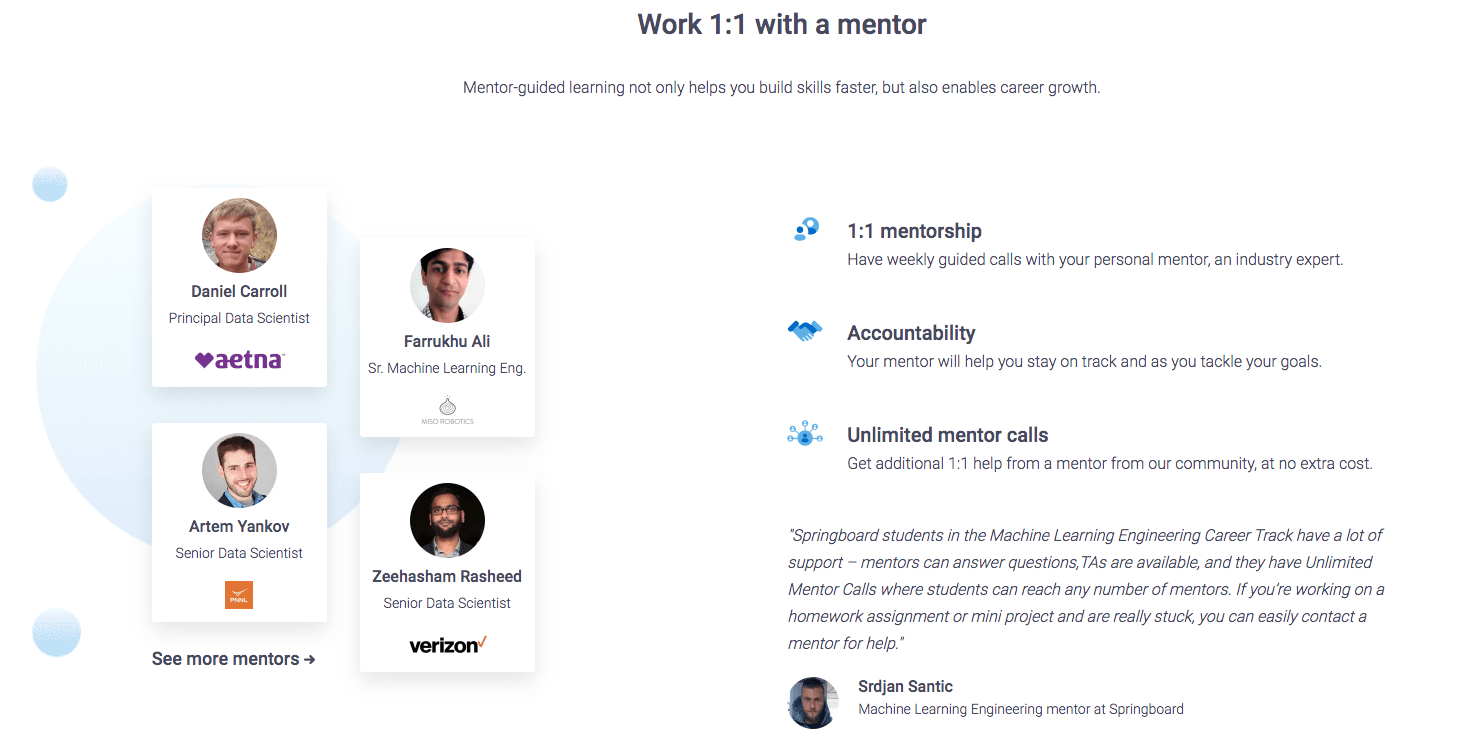
How Apziva’s Director of AI broke into Machine Learning was originally published on Springboard.
We interviewed Apziva’s Director of AI & Springboard mentor, Semih Yagcioglu. Here are our key takeaways — diving into how Semih broke into Machine Learning, his role managing a team of engineers & researchers, and his advice for students getting started in the field.
How did you get interested in machine learning?
I work as the Director of Artificial Intelligence at Apziva where we focus on building AI-based solutions to real-world problems including hands-on training in Machine Learning and providing consulting to our partners in the areas of various AI topics. In the meantime, I am working towards completing my Ph.D. in Computer Science at Hacettepe University where I focus on developing methods for better comprehending and reasoning about multimodal how-to guides. Before Apziva, I was leading a group of researchers and engineers in AI/ML at STM. I have been involved with Machine Learning for several years now but the last five years happened to be more intensive as the recent developments around Deep Learning spurred a lot of interest in both the industry and the academy.
My exposure to Machine Learning began when I was an undergraduate in the Computer Engineering department at Eskisehir Osmangazi University. Apart from taking the relevant courses, I had the opportunity to work on a Computer Vision problem as my senior year project. After graduating I worked as a Software Engineer for a couple of years in the industry in various projects. Back then Machine Learning was not that popular, especially in the industry. Therefore most of my efforts on working in the field started heavily around when Deep Learning started to change the status quo in the research.
Alongside my Ph.D. in Computer Science I was working as a Machine Learning expert in the industry, where I had the opportunity to work on various Natural Language Processing projects as well as Computer Vision projects. Apart from the development and design I also delivered several training courses in the Machine Learning field.
How was switching roles within the space? What was the role transition was like from your previous role to your current role?
In my current role, I am responsible for managing the whole AI efforts including strategic planning, research, development, training, and consulting. Switching roles is almost always a challenge but if you happen to build the skills you would need in your next role, then that transition should be a smooth one. In my case, I had the opportunity to build those skills during my previous role, therefore it was a smooth transition for me.
What’s it like to lead a team of engineers and researchers in AI/ML, as you did in your previous role?
Leading such a team towards solving various real-world problems is a very challenging task, yet it is very rewarding in various ways. One particular challenge is that especially in regards to Machine Learning is that the expertise level of the team members should match with the problem you are trying to solve. A more senior team is preferable to a junior team if you want to solve challenging tasks. Especially, for applied research problems the degree of uncertainty is often a bit higher than the regular software development projects. Therefore you need to take this into account and plan accordingly. Another challenge is due to the nature of the applied research problems we were dealing with, having an agile mindset is very important in the sense that you need to adapt as quickly as possible to the everyday challenges. To clarify a bit, in a research project you often try to falsify a hypothesis, or more simply you try to find a way that works after countless trials and errors. In an applied research project, however, you need to build a product or a service around your research. This requires a lot of effort and making decisions under several constraints.
What was it like transitioning from a software position to an ML one?
I think in some ways it is a completely new world and in other ways, it is very similar to software development. Having a solid understanding of how software works and being able to develop software lays a good foundation when making that transition. However, the tools, the terms, the concepts are completely different from the standard development perspective. My advantage was I had already prior exposure to machine learning before making that transition. In that regard making the transition was not that hard for me but even though I was familiar with the concepts and had prior ML experience it required making a lot of changes in my daily work routines. I think the most challenging part when transitioning from a software position to an ML position is that you need to get used to designing and training a model to solve your problem instead of coding every detail and case.
How has your experience been with Springboard when it comes to mentoring?
I think I had one of the best experiences so far in terms of working with Springboard. I mean from the first minute when the Springboard team approached me, to the whole onboarding process as well as the mentoring experience everything was very smooth for me. In regards to mentoring, I am very happy that I started mentoring with Springboard. One particular reason for this is that it is very fulfilling in the sense that you are making a huge impact on someone’s life by both providing your expertise in the field but also sharing your experience with them while providing guidance throughout the program.

What advice would you give to people looking to learn machine learning?
I believe hands-on experience is really important when it comes to machine learning. As a side note, it became really easy to find resources or materials on the web but machine learning is a huge field and one can easily lose her way among the plethora of content. In that regard, I would advise seeking guidance from someone whom you can trust to at least help you get on your feet while gaining hands-on experience.
What advice would you give to somebody looking to start their career in machine learning?
Having a solid understanding of math and programming is important when it comes to starting a career in ML. But it might seem a bit intimidating if you don’t have a solid background in those areas. If this is the case, you can follow a top to bottom approach while learning ML and start developing ML models in a short time but becoming an expert takes years and if you do not stop investing a decent amount of time in developing yourself in ML I think it will pay off even though it is hard.
Ready to start or grow your machine learning career? Check out our Machine Learning Career Track —you’ll learn the skills and get the personalized guidance you need to land the job you want.
The post How Apziva’s Director of AI broke into Machine Learning appeared first on Springboard Blog.

